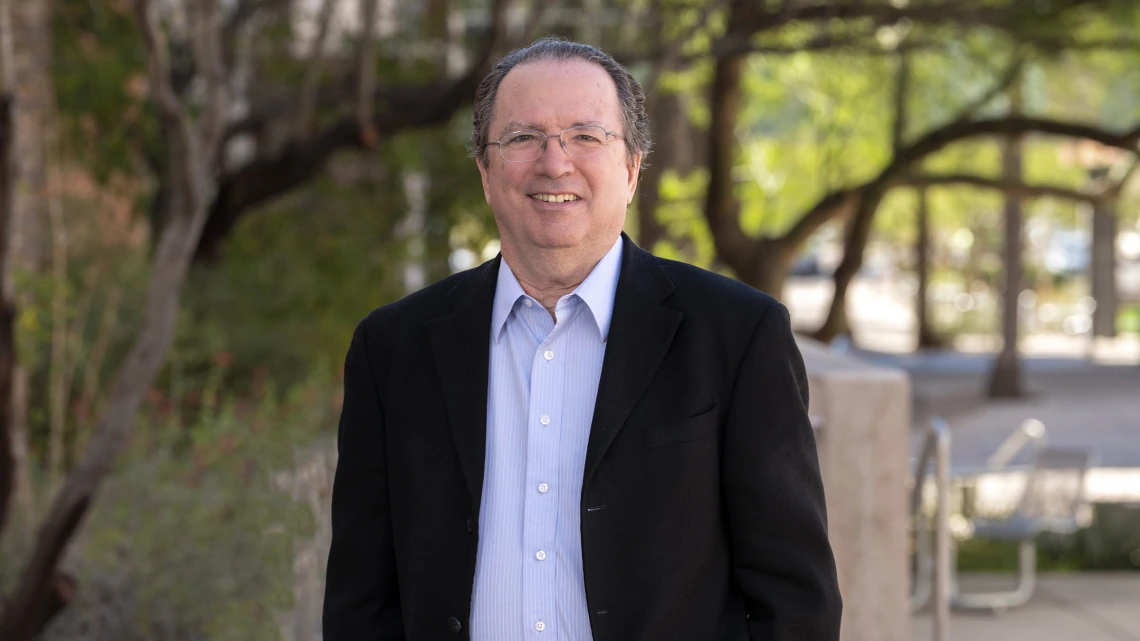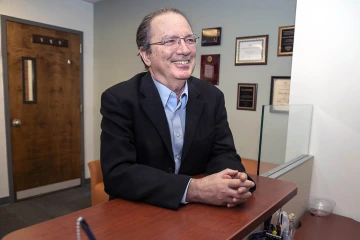Connecting with Dr. Fernando Martinez
Director of UArizona Health Sciences’ Asthma and Airway Center has deep connection to making sure everyone breathes easier.

Fernando D. Martinez, MD, Regents Professor and director of the University of Arizona Health Sciences’ Asthma and Airway Disease Research Center.
For the past 40 years, Fernando D. Martinez, MD, Regents Professor and director of the University of Arizona Health Sciences’ Asthma and Airway Disease Research Center, has been dedicated to finding the causes and ways to prevent asthma and chronic obstructive pulmonary disease.
Chronic diseases of the airways affects nearly 545 million people worldwide as of 2017, a nearly 40% increase from 1990. Finding ways to treat and cure these diseases can have a global impact.
Health Sciences Connect caught up with Dr. Martinez to learn more about what inspires him, how the pandemic impacted airway research and what is the next frontier in airway research.
How did you first become interested in asthma research?
When I was a little boy, my mother had very severe asthma. The first thing I remember in my life is when I must have been three or four years old, and I saw my mom having a very severe asthma attack. It was at night, and I remember seeing from a little narrow space in the doorway having a narrow view of my mom. I woke up and I thought initially it was a nightmare, but it was not. It was my mom not being able to breathe. I promised myself that one day I would cure asthma. It was something that stuck with me until now. I have been a complete failure. I haven't cured asthma yet, but I have tried. In a certain sense, I have fulfilled my dream, which is to be able to dedicate my time to solving a disease that was so important in marking my life.
How did you join the University of Arizona?
I am originally from Chile but because of turmoil in the country, I left for Italy during my last year of medical school. Years later, I was given the chance to come to the United States, which is the place where I really thought I could try to cure asthma. I have been at the University of Arizona since 1987. I rose from the lowest possible rank, which was as assistant research scientist. I worked my way up and became center director in 1996. I have been director of the Asthma and Airway Disease Research Center since then. A2DRC was one of the first centers created at the University of Arizona and we have been continuously funded as a center since 1972.
What is your goal as director of the center?
The holy grail is to prevent these chronic diseases and keep people from developing asthma, COPD, cystic fibrosis, sinusitis and other diseases of the airways. That is our final goal. Curing diseases is a little bit more of a difficult endeavor

Fernando Martinez, MD, says seeing his mother deal with severe asthma when he was a child inspired him to seek a cure for the chronic disease.
What we need to do is first identify susceptible people, but at the same time, match these people with the right protective exposures and avoid the wrong exposures. Asthma is caused by a myriad of genes. Indeed, it is just subtle, little differences in those genes, that then interact with exposures, like maternal smoking. One of the most important discoveries of the last 30 years is that asthma has increased dramatically, not mainly because we are exposed to new things, but because we are not exposed to the old things. And those old things are our companions along the way - protective bacteria.
Are we too clean then?
While we developed vaccines, we also developed the idea that children and mothers have to avoid getting exposed to any bacteria or virus. By avoiding getting exposed to bad bacteria, we also decreased the exposure to good bacteria. And for the immune system to develop in in the right way, it needs to encounter bacteria and viruses and fungi, and it needs to recognize enemies from non-enemies. And that is helped by exposure. If you avoid exposure your immune system does not develop as well. We need to be exposed to the right bacteria in order to prepare ourselves for our lifetime encounters with the world.
What is the next up-and-coming research focus in airway research?
I have to say two things. The first is a new way to study the microbiome, which is what we are talking about with bacteria. During the last 20 years, the emphasis has been in studying the bacteria that inhabit our body and how they differ between persons with or without certain illnesses. Now what has to happen is, much like genomics, is studies of the microbiome are integrated with those of the epidemiology and immunology of airway disease, especially in early life. If you remember, initially, you heard everywhere the idea that once you understood the genome, you could understand life. It was delusional because we are not our genes; we are much more than our genes. And as genomics has become increasingly more a part of all biological sciences, the same thing is going to happen with the microbiome. We are going to integrate more “omics,” from genomics to proteomics to metabolomics, to all the different parts of what we are.
The other aspect may surprise you. It is artificial intelligence. As I said, I am old enough to have seen what happened with genomics - initially, people thought it's going to solve everything. People say artificial intelligence is going to solve everything, and we are going to get these robots that are going to conquer the world. Nonsense. What is going to happen with artificial intelligence is the same thing as every other technology. At the beginning of the genomic era, many people were concerned that “oh my goodness, they're going to create artificial children.” That didn't happen. I am very hopeful about artificial intelligence once that this becomes like everything else, one more tool – a very, very important one - to help science enormously. I am completely convinced that artificial intelligence is going to be the next frontier.
But these tools and their practitioners need to be put together with researchers and scholars thinking about specific human problems. Artificial intelligence is not going to solve all human problems on its own. It needs to be integrated into each of the other disciplines and used to solve the major questions that we have in each of our disciplines. Perhaps using these tools one day scientists working together in centers like ours will find the cure for asthma.

